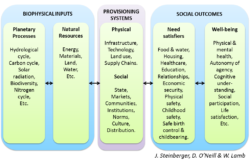PhD Position
Contact: If you have any questions, please contact Dr Julia Steinberger, j.k.steinberger(at)leeds.ac.uk & Dr Dan O’Neill D.ONeill(at)leeds.ac.uk .
Sustainability Research Institute, School of Earth & Environment, University of Leeds.
A fully-funded 3.5 years Leverhulme PhD is available to UK/EU national or resident candidates only. The funding will included tuition fees, tax-free stipend at the RCUK rates (£14,296 for 2016/17), and research training and support grant.
Application deadline: 28 April 2017
Project Summary
The Living Well Within Limits (LiLi) project is an ambitious interdisciplinary programme, addressing crucial but understudied questions: What are the biophysical resources, more specifically energy, required to achieve human well-being? What influence do social and technical provisioning systems have on the levels of resource use associated with well-being? The LiLi project’s ambitious aim is to construct the conceptual and methodological framework upon which this type of research can be carried forward, and to apply it using both quantitative and qualitative methods to analyse and model the energy requirements of well-being. The LiLi project is based on an innovative framework (shown below), integrating biophysical resource use, the social and physical provisioning systems which draw up on these resources as inputs, and the social outcomes which depend upon them.

Figure 1: Analytic framework of the LiLi project.
Process of application:
If you are interested in this PhD, please follow the following 3 steps.
- Develop brief (2 page) description of the PhD project, based on the summary below. This description should your research plan. The Faculty of Environment at the University of Leeds allows PhD by alternative format, which effectively means 3 first-author peer-reviewed publications. Your plan should thus include (1) the context, including references to the literature, and why this topic is interesting to you; (2) the main research questions, methods and possible outcomes of what could be 3 publications. This description will enable us to assess how you write and how you structure your thinking into specific research elements – it is not a binding contract! Please include this description in your submission materials.
- Complete the formal application process here:
http://www.see.leeds.ac.uk/admissions-and-study/research-degrees/how-to-apply/ - If there is any question you might not qualify for EU/UK fees, please fill out the Fees Assessment form, and send it to Rp Applications rp_applications(at)adm.leeds.ac.uk.
Summary of the PhD project
This PhD project within LiLi will principally pursue quantitative analysis at the international level. The analysis should focus on explaining the role of provisioning systems in explaining variations and trends in the “environmental efficiency of well-being”.
The PhD project will take the nation-state as its unit of analysis, conducting top-down international analysis over several decades (highest geographic and temporal coverage). This project will investigate differences in the resource endowments of countries, their level of infrastructure build-up, economic and technological capabilities, governance characteristics, and social and cultural factors. The applicant should therefore be capable of working with large international datasets, and should be interested in international development pathways and political economy.
The PhD analysis will focus on the role of physical and social provisioning systems in explaining (in statistical terms) international, income and household variations. The outcomes of these analyses will be estimates of the energy service “baskets” required, at the international, income class and household levels, for human need satisfaction. Most importantly, the significance of social and physical provision systems in explaining differences in well-being vs. energy use performance will be fully explored, thus enabling priority energy service systems for well-being to be identified.
The PhD research will in all cases be undertaken within a larger collaborative group related to the LiLi project. The outcomes of the analysis will enable more precise estimates of the energy services required for human need satisfaction, taking into account the importance of economic inequality and geographic location (climate, housing & transport types, urban-rural differences) in determining the services accessible and affordable to different groups.
There will be opportunities to translate the research findings into formal models to test scenarios upon, as well as to participate in community-level case studies of energy use and well-being in several countries. The Faculty of Environment at the University of Leeds encourages PhD dissertations by alternative format, encouraging the publication of PhD research in international peer-reviewed journals.
Suggested reading
Steinberger, J.K., Roberts, J.T., 2010. From constraint to sufficiency: The decoupling of energy and carbon from human needs, 1975–2005. Ecol. Econ. 70, 425–433. doi:10.1016/j.ecolecon.2010.09.014
Steinberger, J. K., J. T. Roberts, G. P. Peters and G. Baiocchi (2012). "Pathways of human development and carbon emissions embodied in trade." Nature Climate Change 2: 81–85.
Lamb, W.F., Steinberger, J.K., Bows-Larkin, A., Peters, G.P., Roberts, J.T., Wood, F.R., 2014. Transitions in pathways of human development and carbon emissions. Environ. Res. TLett. 9, 1–9. doi:10.1088/1748-9326/9/1/014011
Abu Sharkh, M. and I. Gough (2010). "Global welfare regimes: A cluster analysis." Global Social Policy 10(1): 27-58.
The LiLi project is funded through Dr Julia Steinberger’s Leverhulme Trust Research Leadership Award.
